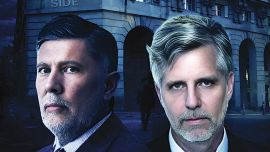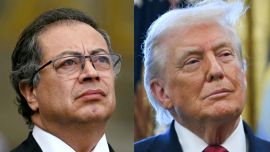This interview was agreed before the deputies voted, with the aim of drawing a balance of the first two years of your term. The purpose is to try and understand presidential thinking but I cannot refrain from asking you about things happening this very week.
Objectively, it’s a setback. I’m a man who cares deeply for the rule of law, very mindful of preserving it. There are situations in our institutions which are difficult to explain. What happened to the Budget is difficult to explain. They could have abstained, they could have questioned things. I proposed to them a return to committee for dialogue and to see what they wanted. I was convinced that they had picked up the claims of different provinces but evidently the problem was not that, it was something else. It was blocked by some kind of political posturing, by infighting. That seems very serious to me.
What difficulties does that create for the year ahead?
Many provinces will be left without funding to start the year with public works. I see difficulties in carrying them out and every Argentine should know that. This complicates the public works planned by [the provinces of] Santa Fe and also Misiones, which had been preparing to go through with a duty-free zone and now that’s blocked.
Government spokesperson Gabriela Cerruti spoke of a sequence of three steps: first, approval of the Budget, then approval of the plan spanning several years and then, possibly, the approval of an agreement with the International Monetary Fund. Will this timetable be modified?
I’ve spoken to Kristalina Georgieva, who was surprised to see that the Budget had not been approved. It seemed weird to her that this could happen in a country but we conversed over how we could continue following all the steps, leapfrogging Budget approval by using the Budget of the previous year and adjusting it by any means necessary so that the administration can function and public works begin. We will see which of the new public works can be carried forward. And we will go ahead with the programme spanning many years as the basis of our agreement with the IMF.
To what do you attribute the loss of votes between the 2019 and 2021 elections?
They were two dreadful years experienced by Argentine society and the world. We may not be aware of it but all of us here are survivors of a world attacked by a virus claiming millions of lives while we survived. I’ve tried to explain to myself why, having done so much, I have not been sufficiently appreciated by society.
A Spanish study has reached the conclusion that pandemics are experienced like wars. You don’t know when a bomb is going to fall on your roof; when you hear a siren, you hide in your basement and when you go out into the street, you’re afraid of a bullet in the head. There were the same fears in the pandemic. The bullets and bombs were the virus. Now the pandemic is starting to come to an end so how do we face the post-pandemic world? The same way as in the post-war period.
It’s a time when you feel like a survivor of a world in ruins. The sociologist came to the conclusion that this was why Winston Churchill lost the elections. He won the war and lost the elections because it was felt that Churchill represented a bad moment.
So the bad moment is associated with a person?
That’s part of the explanation. We failed to understand that what people most wanted was to exit that situation. We staged a war campaign talking about how many hospitals we had opened and how many intensive care beds, artificial respirators and vaccinations we had organised. The people wanted us to talk about something else.
With the pandemic there reappeared the phantom of the grieta chasm in Argentina, which was something we wanted to place behind us. Argentine politics, which at times is really wretched, again widened that chasm. I’m speaking generically, not about anybody in particular. And within that grieta chasm we went to extremes and thus lost part of that electoral middle ground which had trusted us in 2019.
There you have two reasons, perhaps there are more.
In most countries the governments lost but in Argentina many governors, responding both to the government and the opposition, won.
The election was nationalised since it was basically national deputies who were being elected.
To what do you attribute the comeback between September and November?
To us taking heed and the campaign changing diametrically. We moved from talking war to saying: “Yes!” Yes to creating jobs, production and diversity. I asked myself frankly what I had done wrong and then recalled a chat I had with [French President] Emmanuel Macron. I asked him how he had managed to bounce back from the ‘gilets jaunes’ protest, which had appeared unexpectedly when he decreed a measure which nobody thought would have the repercussions it did. He told me: “I left the Élysée Palace, drove home and started meeting with people and listening to them.”
That’s what I did. I met some marvellous people. I have a teacher whom I met in Temperley working with me. She is very worried about the mental health of the kids, helping me to find answers and mechanisms for the problems of adolescents. If there is something which I punish myself for, it is not having realised how much the pandemic had affected feelings and social psychology.
Another hypothesis speaks of “social fracking” where the millennial generations do not feel represented by the 40-plus-year-old militants of La Cámpora and their ideas of a greater fatherland because technology has eliminated distances, converting everybody into citizens of the world, added to which the new generations have lost a link of contact with stories of the Cold War and 1970s ideas of revolution …
I’m not in a position to say that that is not so. I have the feeling that the pandemic exacerbated in youth the worst aspect of postmodernism – individualism. You realise that you can do everything from home, not needing to go to school or a workplace. You don’t need to move from your home since everything can be done from a computer.
So is there no more need for a “nation” if you can work from another country?
Exactly.
Is [libertarian deputy] Javier Milei a symptom of that process?
It’s a situation in which such postmodern individualism becomes exacerbated.
Do you see it as cyclical?
When individualism becomes exacerbated, some kinds of anti-system politics appealing to youth sectors may emerge. Their effects tend not to be lasting.
In an interview in this same series, a self-styled Chicago boy, Carlos Rodríguez, said that he had conversed with you when you were Cabinet chief and that his feeling was that you were liberal and orthodox. It might be said that Néstor Kirchner also sometimes spoke like a liberal when he defended his twin surpluses. How would you define yourself in economic terms?
I don’t like such definitions, they’re dogmatic. Like I said at the start of this interview, politics is the art of transforming reality.
There is no single way of correcting the economy – there are different options. There are times when more heterodox measures are needed and times when orthodox measures are required. Néstor was obsessed with balanced budgets and fiscal surpluses.
I’m always telling anecdotes about Néstor answering a minister who came asking for money by telling him to come and see me. And while the minister was heading for the Cabinet Chief’s office, Néstor came in by the front door to notify me of the request and to ask me not to give him anything which would ruin the Budget. In one campaign meeting before he took office, somebody spoke of fiscal deficits as a virtue. Néstor left the answer to me. I explained that fiscal deficits are not good. Sometimes they must be endured in conditions requiring them for the present but always living that way is bad.
Is your aim to substantially reduce the fiscal deficit by the end of your term?
We must order the public accounts. I explained in that aforementioned meeting why they had to be corrected and ordered. When I finished, Néstor said: “Boys, don’t bug me anymore with this. Surpluses are not a problem of the left or right, they are common sense.” It’s the same for me.
Your economy minister would say the same.
It’s a problem of common sense. We cannot live permanently spending more than we collect. At some point that’s going to generate a conflict in our economy. I think that’s perhaps why Carlos Rodríguez, whom I only met once in my life, came to that conclusion when comparing me to other people. I definitely believe in capitalism, no doubt about that.
The 2022 Budget, which has yet to be approved, forecasts four percent growth, 33 percent inflation and an exchange rate of 131 pesos per dollar by the end of the year, while the specialists say that inflation will be around 50 percent and that Martín Guzmán is deliberately underestimating it because he can reduce the deficit with the difference of the inflationary tax. Will inflation really be 33 percent?
We will do the impossible to reduce inflation drastically in Argentina. It’s a very complex task because you have to bear in mind how food production works. And it’s also a more complicated world. This year [2021], inflation in the United States will increase by six percentage points or 100 percent as against the previous year. Exactly the same thing is happening in Europe – it’s a global phenomenon. And it’s also happening with beef in China.
At the end of the day you see debt, inflation, crisis, devaluations and the collapse of convertibility. You see dictatorships and democratic governments, right-wing and progressive governments, plans with the IMF and without them. Would it be fair to say that the debt transcends the Mauricio Macri government and is a problem of the failure of Argentina as a whole?
I do not share that outlook. Argentina had many problems but not debt in foreign currency. In 2015 that debt represented approximately 14 percent of Gross Domestic Product. That was nothing, we did not have that problem.
What would you have done?
I would have followed a programme of growth for Argentina. All Macri’s logic failed. He proposed draining the state financially. He lifted export duties from mining and even so they were the four worst years for mining production. He lifted the export duties from farming and they did badly. He drained the country and to finance the deficit he resorted to credit, going first to private bondholders, who sold out when they realised that they would not be able to collect their money and stopped lending, which is when he resorted to the IMF.
Was it a consequence of previous errors?
The option which Macri permanently found to solve his fiscal problems was dollar debt. It was also peso debt because the state had to pay everything in pesos and run up debt in dollars, which was totally irresponsible. The IMF has just finished its analysis of Macri’s plan. It is a complaint of staggering rigour.
What is your feeling about renegotiation after talking to Georgieva?
We’re on the right path and approximating positions. But the big difference with Macri is that he told the manufacturers of sneakers, garments or food to stop working and import the products instead, thus destroying the industrial machinery to a staggering degree. Importing requires dollars and to sustain that, the only thing he knew what to do was to fall into debt.
The error was running up debt with private creditors. Would a default have been preferable at that point?
It should never have happened. I wouldn’t have fallen into debt in that way, that would have been impossible. Falling into debt is exactly the same for a country as it is for any citizen. It restricts your scope and your liberty.
In Ancient Rome, civil rights were lost.
When Macri said that he fixed the debt problem in five minutes, he was telling the truth. He would have accepted all the IMF conditions. He also would have settled with the private creditors in two minutes. They did it by “reprofiling.” Every time they “reprofiled,” they paid more interest rates. It’s an illogical logic. We must emerge from the debt problem. Not paying it is not the solution but paying it in conditions whereby Argentina’s growth and development is not impeded. We must achieve growth with social inclusion.
Proposing that for the next elections in 2023 all candidates must be chosen via the PASO primaries implies a different role for Cristina Fernández de Kirchner, who will no longer be the great elector?
It means that everybody will have the possibility of being a candidate. I have drawn this conclusion from my personal experience. I have been a lifelong Peronist militant. In 1983, Peronism was convinced that it would win any old how. They said that [Radical Raúl] Alfonsín was the Coca-Cola candidate, placing a Coca-Cola bottle between Alfonsín’s hands when he made his typical gesture. And we dared to name as our presidential candidate a very conservative man, Ítalo Argentino Lúder, who said things that for many of us were atrocious, such as that the military self-amnesty was valid. And for Buenos Aires Province, an old militant hardly representative of the new times which Argentina wished to live in, Herminio Iglesias, was picked and did very badly. We lost and had to face up to the defeat to realise that we had to renew something which was not working. That’s how we created Renewal Peronism in 1985 when José Manuel de la Sota, Antonio Cafiero and Carlos Grosso became deputies, while in 1987 Cafiero was elected Buenos Aires Province governor. In 1989 Carlos Menem, who formed part of that renewal, became president.
By 2023 it will have been 20 years since Néstor Kirchner took office. In those 20 years Kirchnerism was the centre of Argentine politics since out of those 20 years we will have governed 16. Not understanding that such a length of time causes erosion in any political force is an error. And the only way of avoiding that erosion is to promote debate and encourage the appearance of new figures. That’s how it is, I do not see any other way.
Before November 17, I said that I would not do the same as in 1983. I’m not going to wait to lose before embarking on renewal. Self-renewal in order not to lose is my obsession. The damage done to the country by Macri’s government is beyond all measure. I’m just one more militant. If I want to be president, let the people vote for me in a primary and whoever wants to compete against me is welcome to do so. And please let us mobilise all our political force so that such a renewal occurs in order to democratise the truth.
So are you answering me that you are going for reelection?
If the conditions are right, yes. I will do everything possible to keep our political force in government.
























Comments